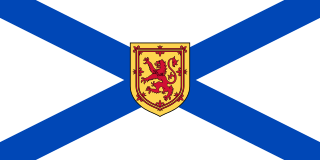
Cape Breton Island is a rugged and irregularly shaped island on the Atlantic coast of North America and part of the province of Nova Scotia, Canada.

Nova Scotia is one of the thirteen provinces and territories of Canada. It is one of the three Maritime provinces and one of the four Atlantic provinces. Nova Scotia is Latin for "New Scotland".

Scottish Gaelic, also known as Scots Gaelic or simply Gaelic, is a Goidelic language native to the Gaels of Scotland. As a Goidelic language, Scottish Gaelic, as well as both Irish and Manx, developed out of Old Irish. It became a distinct spoken language sometime in the 13th century in the Middle Irish period, although a common literary language was shared by the Gaels of both Ireland and Scotland until well into the 17th century. Most of modern Scotland was once Gaelic-speaking, as evidenced especially by Gaelic-language place names.

Pictou is a town in Pictou County, in the Canadian province of Nova Scotia. Located on the north shore of Pictou Harbour, the town is approximately 10 km north of the larger town of New Glasgow.

The Gàidhealtachd usually refers to the Highlands and Islands of Scotland and especially the Scottish Gaelic-speaking culture of the area. The similar Irish language word Gaeltacht refers, however, solely to Irish-speaking areas.
Hugh Alan "Buddy" MacMaster was a Canadian fiddler. He performed and recorded both locally and internationally, and was regarded as an expert on the tradition and lore of Cape Breton fiddle music.

The Gaelic College, formally The Royal Cape Breton Gaelic College, is a non-profit educational institution located in the community of St. Ann's, on Nova Scotia's Cape Breton Island, along the Cabot Trail. Founded in 1938, its focus has been on the perpetuation of Highland Scottish Gaelic culture.
The province of Nova Scotia is best known for its folk and traditional based music, although other genres have had both an historical presence and recent growth.

Cape Breton fiddling is a regional violin style which falls within the Celtic music idiom. Cape Breton Island's fiddle music was brought to North America by Scottish immigrants during the Highland Clearances. These Scottish immigrants were primarily from Gaelic-speaking regions in the Scottish Highlands and the Outer Hebrides. Although fiddling has changed considerably since this time in Scotland, it is widely held that the tradition of Scottish fiddle music has been better preserved in Cape Breton.

Canadian Gaelic or Cape Breton Gaelic, often known in Canadian English simply as Gaelic, is a collective term for the dialects of Scottish Gaelic spoken in Atlantic Canada.

Rodney Joseph MacDonald is a Canadian politician, educator and musician who served as the 26th premier of Nova Scotia from 2006 to 2009 and as MLA for the riding of Inverness in the Nova Scotia House of Assembly from 1999 to 2009.
Celtic Colours International Festival is a Celtic music festival held annually in October on Cape Breton Island in Nova Scotia, Canada.

Marion Bridge is a Canadian rural community in Nova Scotia's Cape Breton Regional Municipality.

Hector was a ship famous for having been part of the first significant migration of Scottish settlers to Nova Scotia in 1773. The replica of the original ship is located at the Hector Heritage Quay, a heritage centre run by local volunteers, in Pictou, Nova Scotia.
Christmas Island, Nova Scotia (Scottish Gaelic: Eilean na Nollaig) is a Canadian community of the Cape Breton Regional Municipality on Cape Breton Island, Nova Scotia. It has a post office, a firehall and a very small population. It has a beach with access to the Bras d'Or Lake. A small island just off shore, also named Christmas Island, encloses Christmas Island Pond, a pond that runs into the lake.

Scottish Canadians are people of Scottish descent or heritage living in Canada. As the third-largest ethnic group in Canada and amongst the first Europeans to settle in the country, Scottish people have made a large impact on Canadian culture since colonial times. According to the 2016 Census of Canada, the number of Canadians claiming full or partial Scottish descent is 4,799,010, or 13.93% of the nation's total population. Prince Edward Island has the highest population of Scottish descendants at 41%.
British Canadians primarily refers to Canadians who were either born in or can trace their ancestry to the British Isles, which includes the nations of England, Ireland, Scotland, Wales, and Northern Ireland.
Scottish Gaelic orthography has evolved over many centuries and is heavily etymologizing in its modern form. This means the orthography tends to preserve historical components rather than operating on the principles of a phonemic orthography where the graphemes correspond directly to phonemes. This allows the same written form in Scottish Gaelic to result in a multitude of pronunciations, depending on the spoken variant of Scottish Gaelic. For example, the word coimhead ('watching') may result in [ˈkʰõ.ət̪], [ˈkʰɔ̃jət̪], [ˈkʰɤi.ət̪], or [ˈkʰɛ̃.ət̪]. Conversely, it allows the sometimes highly divergent phonetic forms to be covered by a single written form, rather than requiring multiple written forms.

The Highland Village Museum / Baile nan Gàidheal / An Clachan Gàidhealaich is an outdoor living history museum dedicated to Nova Scotia’s Gaelic folk-life, culture, and language. Highland Village is located in Iona, Nova Scotia, Canada, on 43 acres of natural landscape overlooking the Bras d'Or Lake in Central Cape Breton.

Rev. James Drummond MacGregor was an author of Christian poetry in both Scottish and Canadian Gaelic, an abolitionist and Presbyterian minister in Nova Scotia, Canada.












